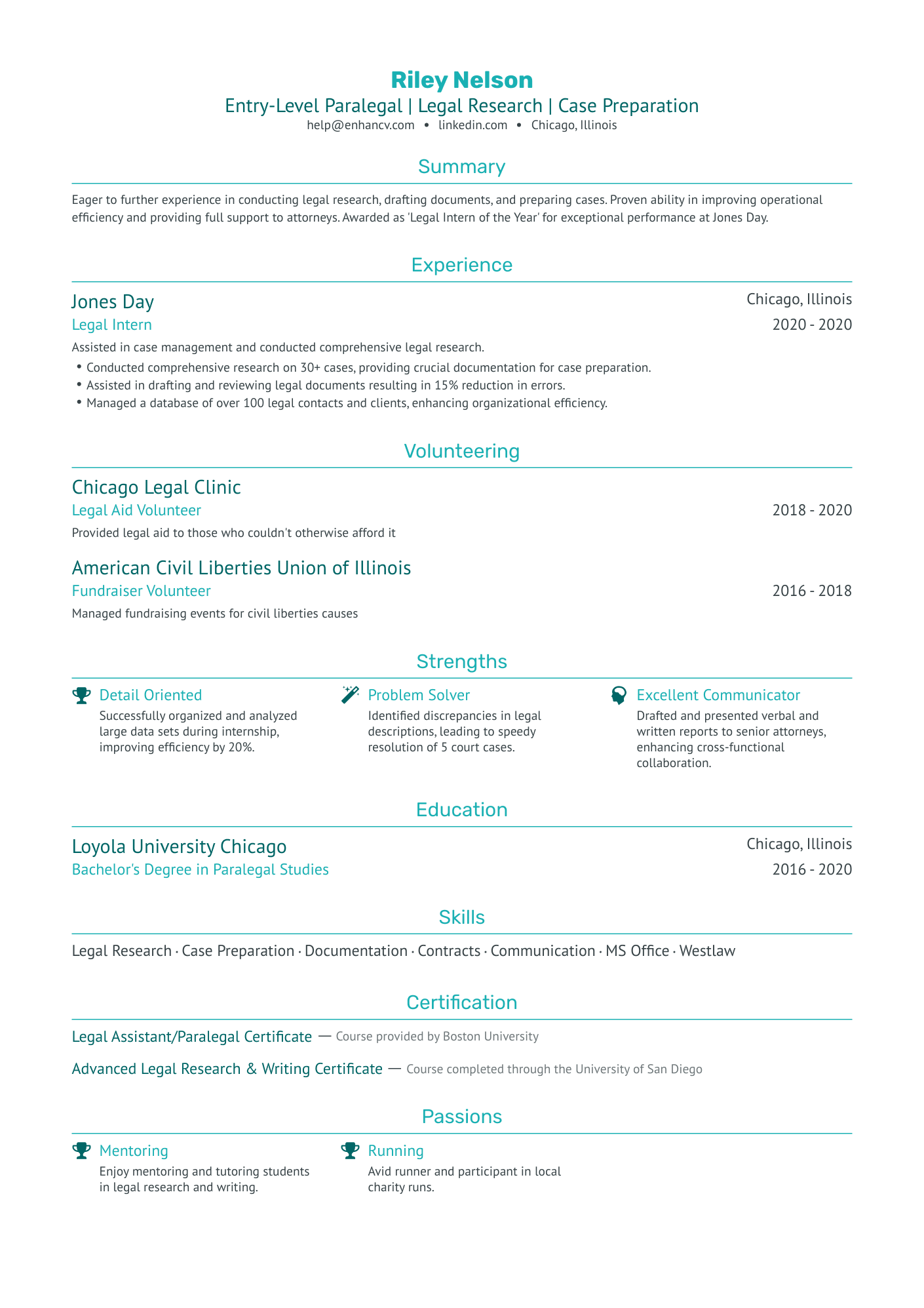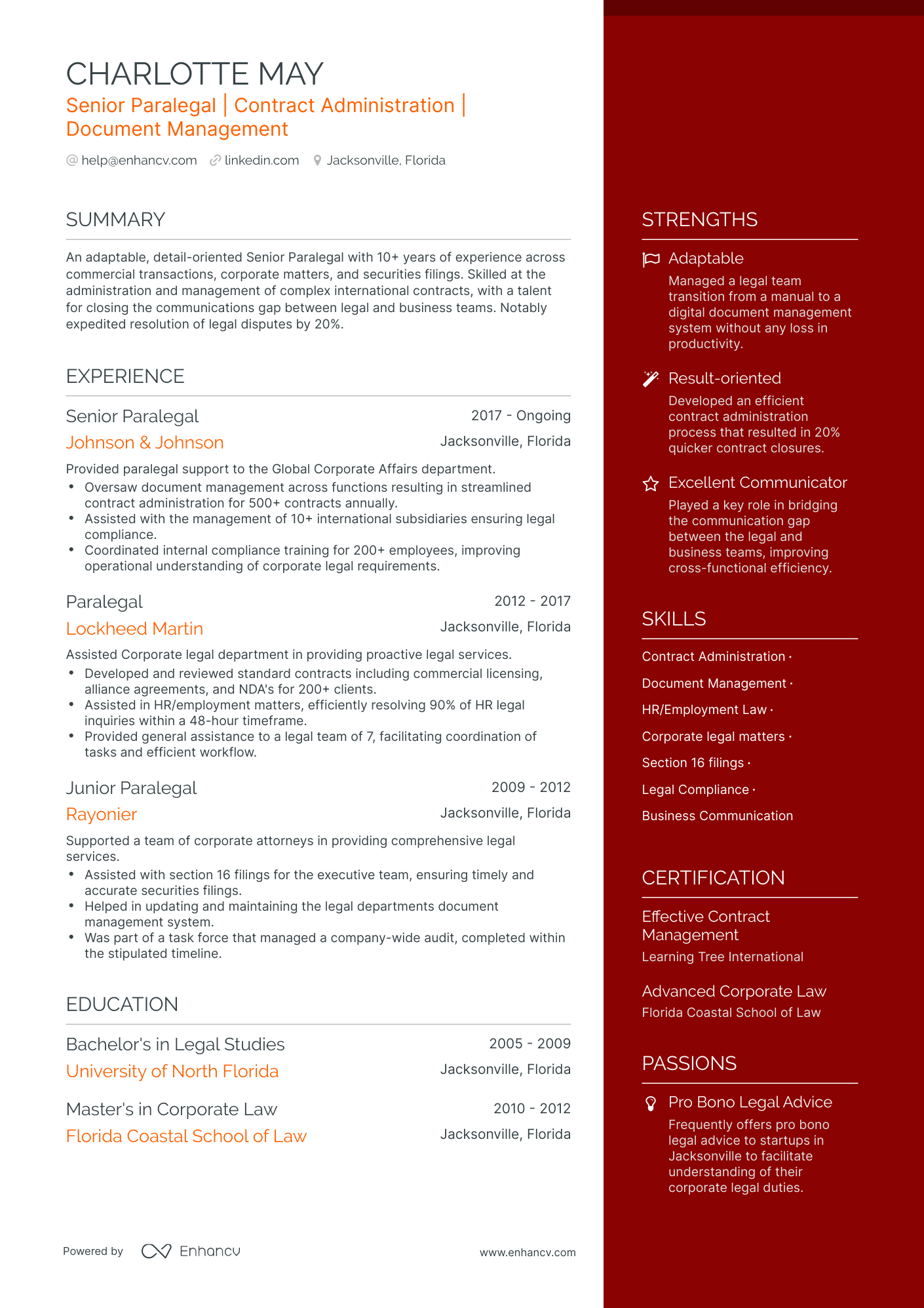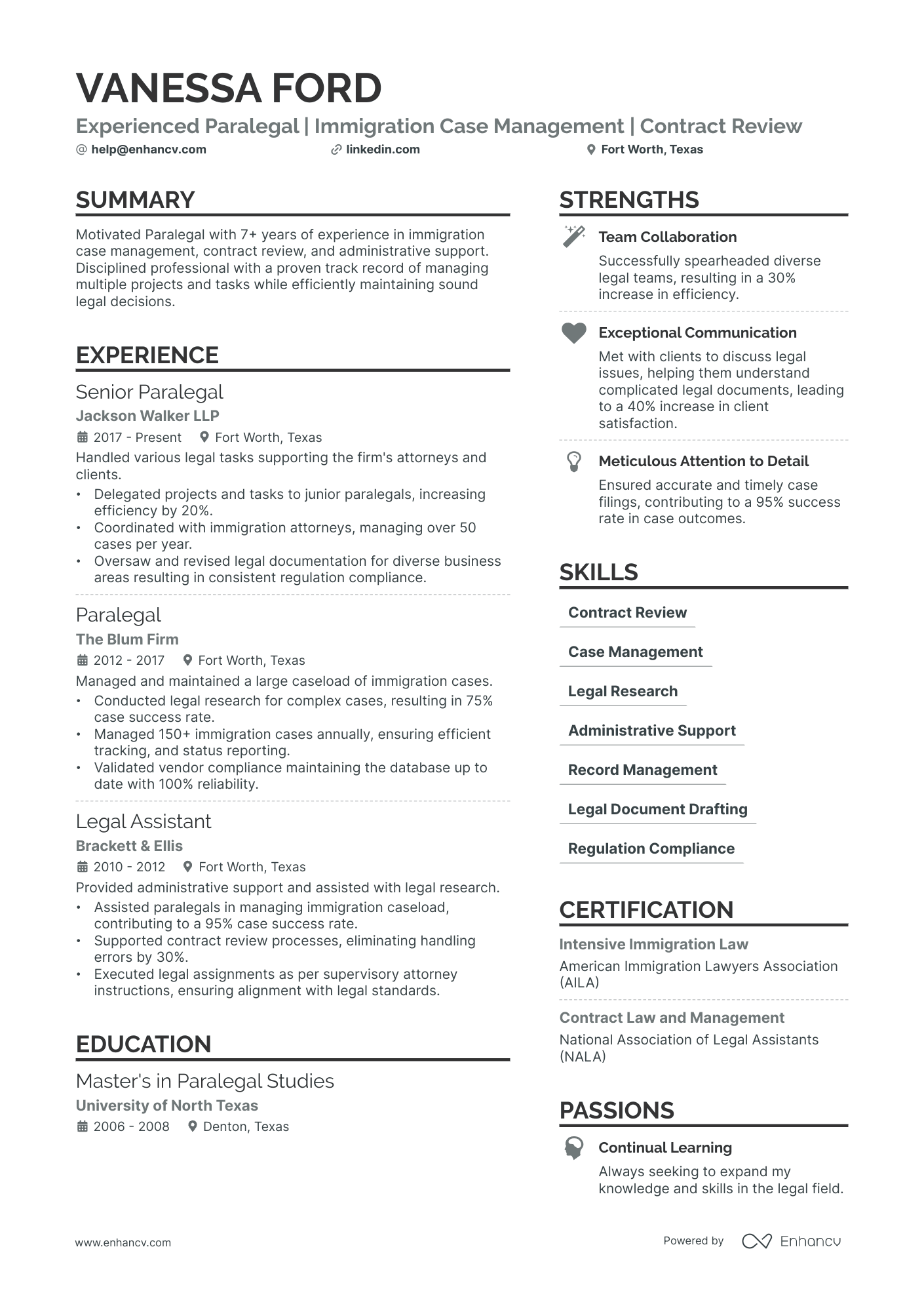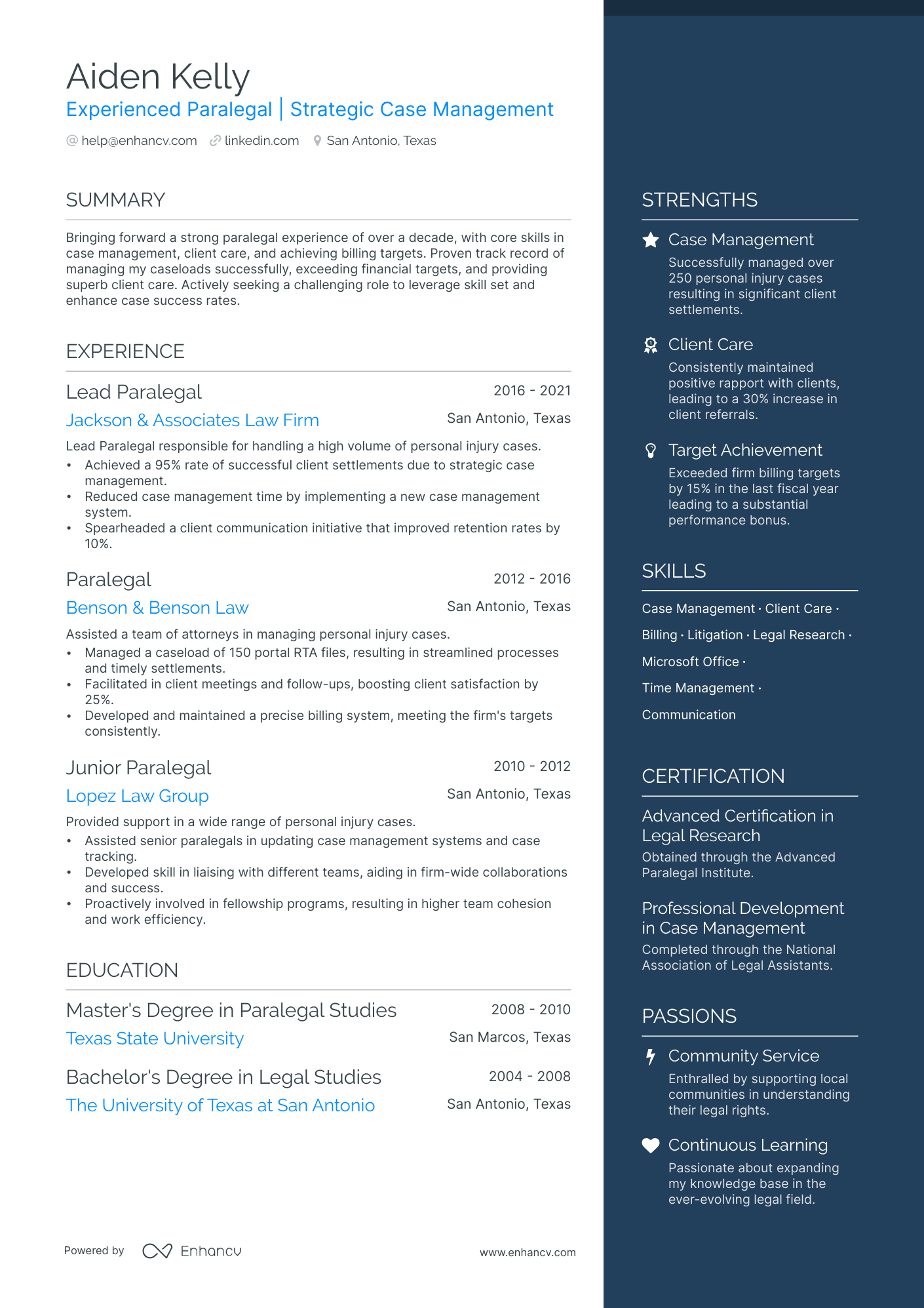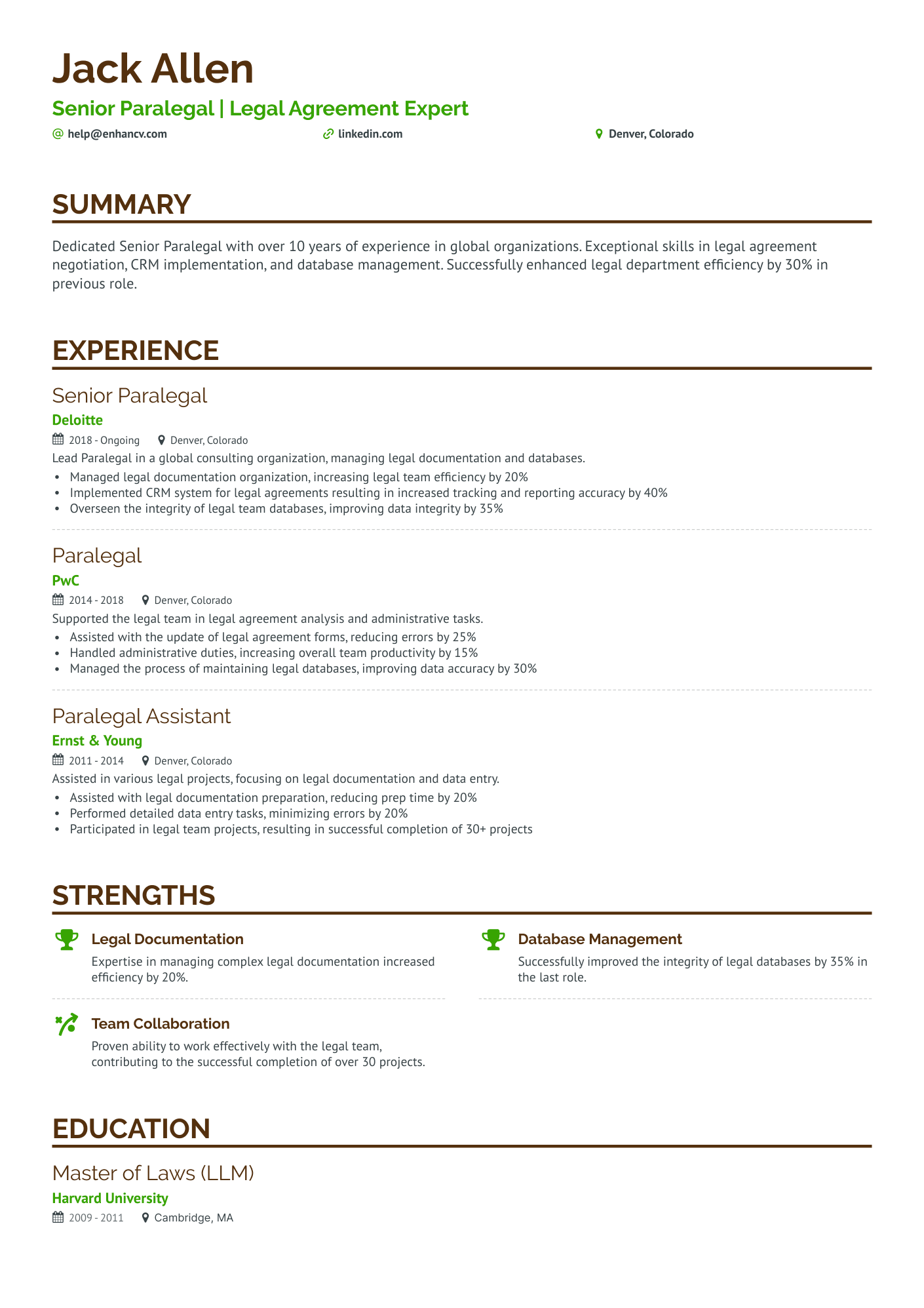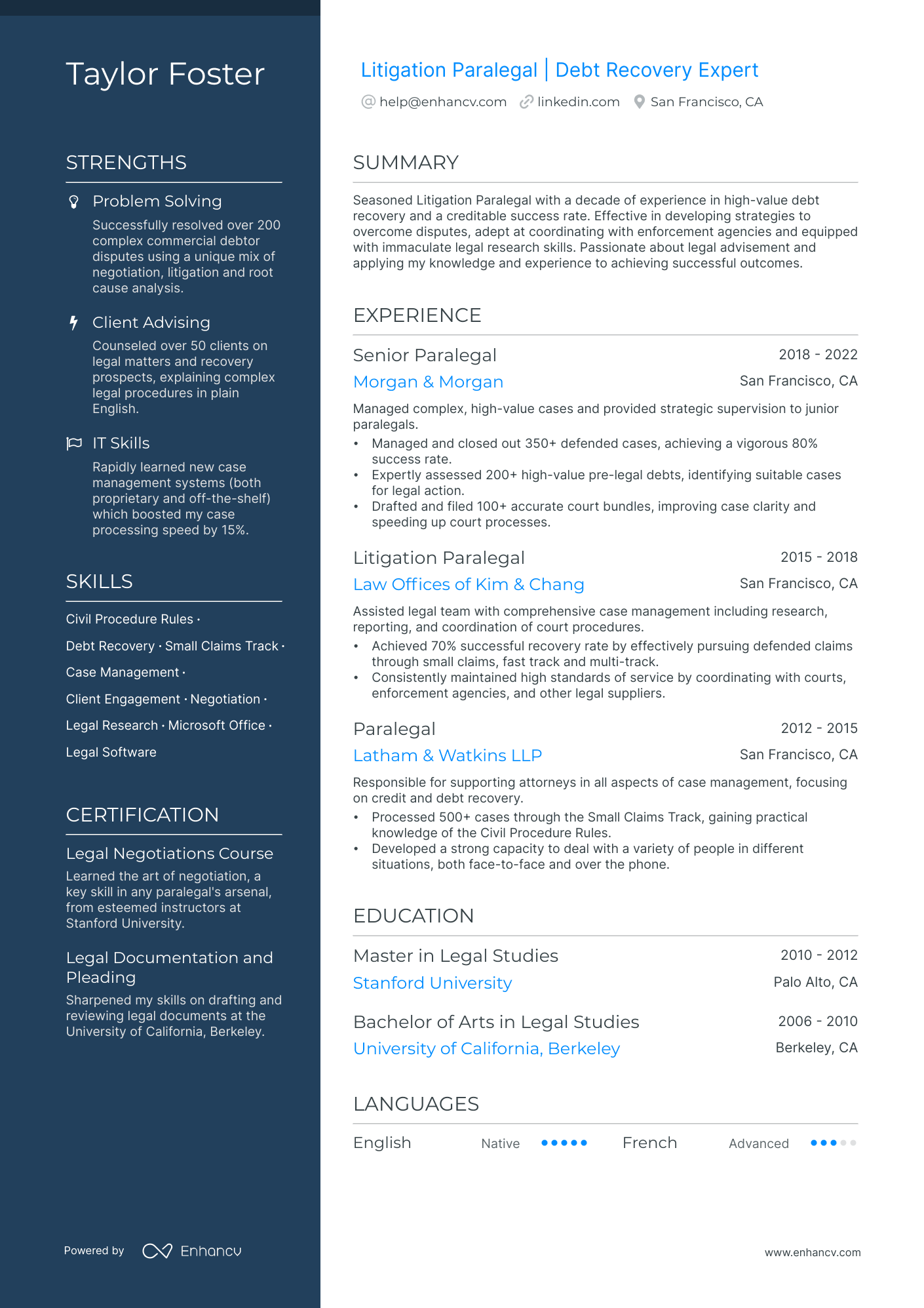Entering the legal field as a paralegal isn't only about having the right skills—it's also about presenting them in the best possible light. Just as every word counts in a legal document, every detail on your resume can play a pivotal role in landing your dream job in this competitive sector. If you’re aiming to construct a resume that's as persuasive as a well-argued case, you're in the right place.
The demand for sharp, skilled paralegals is on the rise. According to the Bureau of Labor Statistics, employment for paralegals and legal assistants is projected to grow 14% from 2021 to 2031, much faster than the average for all occupations. This boom is fueled by law firms aiming to increase efficiency and reduce costs, relying more on paralegals who can perform a variety of tasks—from conducting legal research to helping prepare for trials.
In this guide, we’ll dissect the elements of a standout paralegal resume, from showcasing your legal acumen to highlighting your proficiency in legal software, ensuring you're not just another file in the stack. Let’s lay down the law on resume building and help you close the case on your next job opportunity!
Here are the main topics we’re going to cover in this guide:
- Formatting your paralegal resume, including pro tips and detailed information on all aspects and types. Find the top resume sections and what recruiters are looking out for.
- Writing your work experience section based on an actual paralegal job posting. Including what to do if this is your first paralegal position.
- Listing your skills on a resume and the difference between hard and soft skills. We explore the most sought-after of each type and how to include them in your resume.
- How to properly write an education entry as well as a section on certifications and how to target them to the job posting you’re applying for.
- Producing the most convincing personal statement possible whether that be a resume summary or, if you’re new to the paralegal field, objective statement.
- Additional sections that you could use to make your candidacy more appealing and impressive, especially if you lack related paralegal experience.
If you’re interested in other paralegal-related guides, here are several more that may be of interest to you:
- Senior paralegal Resume Guide
- Paralegal Cover Letter Guide
- Litigation paralegal Resume Guide
- Immigration paralegal Resume Guide
- Personal Injury paralegal Resume
Let’s begin with your resume’s skeleton, the bones of your application—your resume layout and its format.
Paralegals are the backbone of the legal business.
Charles E. Grassley
How to format a paralegal resume
Creating a resume as a paralegal is much like preparing for a court case—each detail must be meticulously organized and presented in the most effective resume format. Let’s explore the different ways you can format your paralegal application to make sure it stands out from the docket!
Reverse chronological order format
- Description: This format lists your work experience in reverse chronological order, starting with your most recent job at the top.
- Best candidate: Ideal for candidates with a solid work history and progression in the paralegal field. It’s great if you want to showcase a timeline of your professional growth and achievements.
- Description: Focuses on your skills and qualifications rather than your work history. This format highlights areas of expertise and specific skills that are relevant to the job.
- Best candidate: Best suited for those with gaps in their employment, newcomers, or career changers who have relevant skills but less traditional paralegal experience.
- Description: Combines elements of both reverse chronological and functional formats. It starts with a detailed skills section and follows with a reverse chronological professional history.
- Best candidate: Perfect for paralegals with strong skills and some professional experience, who want to showcase both in equal measure.
Best format for paralegals
For paralegals, the hybrid format is often the most compelling choice. It allows you to highlight your expertise upfront—your legal acumen, research skills, and case management abilities—while also detailing your professional journey in the legal world. This dual focus acts like a well-balanced legal argument, presenting a compelling case to potential employers.
Further considerations for a polished paralegal resume
Resume designs:
- Keep resume margins at least 1 inch on all sides.
- Use professional colors like blue or dark gray for accents.
- Select readable fonts on your resume like Arial, Rubik, or Times New Roman in sizes 10-12.
- Opt for a single-column layout for traditional industries; a two-column resume can be used for more modern, design-forward firms.
- Resume length should ideally be one page, especially for those with less than 10 years of experience.
- Include your contact information—name, phone number, and professional email address.
- The physical address you include can just be the city and state.
- Include your LinkedIn URL if applicable; ensure your profile is complete and professional.
- Generally, omit your photo unless specifically requested.
- Use standard resume formatting without tables or other complex elements that could confuse Applicant Tracking Systems (ATS).
- Include relevant keywords from the job description to ensure ATS can easily read and classify your resume.
File formatting and naming convention:
- Save your resume as a PDF to preserve formatting across different devices.
- Name your file professionally; use your first and last name along with the title of the position (e.g., JohnDoeparalegal_Resume.pdf).
Crafting your resume with these elements in mind will help ensure it’s not only comprehensive but also has a professional edge—making it "legally binding" on your career aspirations!
Already got a resume? Why not upload it and start improving it? Try the Enhancv resume checker below.
Is your resume good enough?
Drop your resume here or choose a file. PDF & DOCX only. Max 2MB file size.
Here are the top sections every paralegal needs to include in their resume, followed by essential elements recruiters are keeping their eye out for.
The top sections on a paralegal resume:
- Education and certifications show your legal knowledge.
- A legal skills section highlights your expertise in law.
- Professional experience demonstrates your work history.
- Technical proficiencies showcase relevant software skills.
- Achievements and awards to present your successes.
What recruiters want to see on your resume:
- Attention to detail: Crucial for accurate legal documentation and case preparation.
- Knowledge of legal terminology and procedures: Ensures efficiency and accuracy in legal tasks.
- Proficiency in legal research tools: Vital for gathering case-relevant information effectively.
- Experience with case management software: Important for organizing and managing case files.
- Ability to meet deadlines: Essential in a fast-paced legal environment to comply with court schedules.
Now with the base of your resume established we can march ahead into the actual content. First, let’s examine the best ways to detail your professional work history.
How to effectively list your paralegal resume experience
Listing work experience on a paralegal resume is crucial because it demonstrates your practical knowledge and skills in the legal field, showcasing your ability to handle responsibilities and contribute to a legal team.
A work experience entry should include:
- Job title, company name, location, and dates of employment: Establish your professional timeline.
- Key responsibilities: Highlight your relevant skills and daily tasks using keywords from the job description.
- Notable achievements or projects: Illustrate your contributions and successes (quantifiable if possible) with specific examples.
Each entry should be concise, using action verbs to vividly describe your roles and accomplishments, making your experience compelling and relevant to potential employers. Perhaps, the most important thing to remember while creating your document is to always keep the job description in mind—tailor your resume to the job!
A tailored resume is your best weapon in the job hunt. It shows you've done your homework and understand exactly what the employer is looking for.
John Lees, Career Strategist and Author
Besides what we have already mentioned, customizing your resume for each job posting is crucial for many reasons:
- Highlights relevant skills: It allows you to emphasize skills and experiences specific to the job.
- Demonstrates commitment: It shows you're genuinely interested in the role and have researched the company.
- Ensures alignment: Customizing your resume helps illustrate how your past experiences directly apply to the job.
- Meets job criteria: It enables you to address specific qualifications listed in the job posting, making your candidacy stronger.
For more information on personalizing your resume as well as checking your current resume to see how well it aligns with the job you're applying for, check out our targeting your resume resources.
Example paralegal job offer
In order to underline the absolute importance of adapting your resume to individual job postings, we have chosen an actual job ad. Imagine that you see the following position available on a local job board for paralegals and decide to apply for it:
The Lewis Family Firm, APC is looking for a Sr. Personal Injury Litigation Paralegal to join our vibrant and growing personal injury legal team and play an essential part in supporting our litigation function. As the Paralegal you’ll perform many tasks during the litigation process and often work on all phases of litigation, from preparing complaints to preparing for trial. You’ll report directly to our Supervising Attorney.
Responsibilities:
- Prepare drafts of written discovery requests, responses, and PI complaints
- File pleadings/documents with the court with all appropriate attachments required per court
- Prepare legal pleadings, such as motions, 998s, deposition notices
- Prepare subpoenas to obtain records and documentation
- Assist with the production of documents and information by analyzing requests, consulting with internal partners, and obtaining, reviewing, and producing documents
- Guide the process for gathering relevant materials and preparing responses to litigation demands, discovery requests, subpoenas, and agency claims
- Organize and process pleadings, correspondence, exhibits, and other documents
- Coordinate document collections/productions
- Prepare objections/responses to subpoenas
- Manage service of process and daily calendaring/docketing of case
- Draft routine correspondence and support special projects, including fact investigations and interviews; create internal templates, guidelines, and playbooks
Qualifications:
- 3-4+ years of Personal Injury litigation experience as a paralegal in a plaintiff personal injury law firm
- Associate’s, Bachelor’s, or Paralegal Certificate is highly preferred
- Bilingual (English/Spanish) with high proficiency
- Experience with litigation in both California state and federal courts
- Undertake complex projects
- Advanced proficiency in Microsoft and Google software applications
- Familiarity with case management software programs, specifically FileVine
Now, two different candidates are applying for this position. Here are sample entries from each of their work experience sections. As you’ll see, the first candidate may have a less likely chance of landing the job.
- •Handled general administrative duties and provided support to senior paralegals.
- •Assisted with general case management and maintained filing systems.
- •Helped prepare broad legal documents under supervision.
- •Participated in miscellaneous legal seminars and training workshops.
- •Occasionally worked with legal software and tools.
Why this entry doesn’t impress:
- Vague responsibilities: The entry uses generic terms like "handled general administrative duties" and "assisted with general case management," which don’t demonstrate any specialized skills or relevant experience in personal injury litigation. It fails to convey the specific capabilities the job posting demands, such as drafting complex legal documents or managing the litigation process.
- Lack of detail: It mentions preparing broad legal documents but doesn’t specify the types, such as motions or discovery requests, which are critical to the role described in the job posting. This lack of specificity doesn’t showcase any direct alignment with the required tasks of the position.
- Missing relevant skills: There’s no mention of working with FileVine or any specific case management software that the job description highlights as preferred. This omission fails to address a key qualification that could set the candidate apart.
- Irrelevant information: The inclusion of participating in seminars and workshops, while potentially valuable, doesn’t directly relate to the core responsibilities of the job. This information could be perceived as filler rather than substantively relevant to the position.
- Language skills overlooked: The entry doesn’t address the bilingual requirement, which is a significant oversight given the job's preference for a bilingual (English/Spanish) candidate.
Overall, the entry fails to make a compelling case for the candidate’s suitability by not aligning closely with the job's responsibilities and qualifications. It appears underwhelming and generic, lacking the targeted approach necessary to capture the employer's interest.
The next candidate takes the application more seriously and checks all the boxes.
- •Skillfully drafted and filed complex pleadings, motions, and discovery requests/responses, enhancing litigation efficiency and supporting successful legal outcomes.
- •Managed a caseload for multiple high-stakes personal injury cases, ensuring meticulous document control, and coordination, from initial filing through to trial preparation.
- •Conducted comprehensive document productions and analyses, collaborating closely with internal teams to fulfill all litigation and subpoena demands accurately and promptly.
- •Spearheaded the development and implementation of firm-wide case management protocols using FileVine, significantly improving case tracking and data integrity.
- •Facilitated bilingual client and witness interviews, ensuring precise communication and documentation, which increased client satisfaction and firm credibility in diverse communities.
Why this entry is successful:
- Relevant experience: The entry highlights over four years of experience in a personal injury law firm, directly aligning with the job requirement of 3-4+ years of personal injury litigation experience.
- Specific skills: It mentions drafting legal documents, managing case files, and handling document productions—key responsibilities listed in the job posting. This demonstrates a direct match with the technical skills required for the role.
- Software proficiency: By noting experience with FileVine, the entry effectively addresses the job's preference for familiarity with specific case management software, positioning the candidate as a ready-to-go asset for the team.
- Language skills: The inclusion of conducting bilingual interviews caters to the job's preference for a bilingual (English/Spanish) candidate, showcasing the candidate's ability to communicate effectively in both languages.
- Initiative and leadership: The creation of internal templates and the implementation of new protocols show initiative and the ability to undertake complex projects, as desired by the job posting.
Overall, this resume entry strategically mirrors the responsibilities and qualifications outlined in the job posting, making the candidate appear highly suitable and prepared for the position. It effectively conveys relevant skills and experiences, directly addressing the employer’s needs and demonstrating the candidate's potential contribution to the firm.
How to quantify impact on your resume
Quantifying impact on a paralegal resume adds weight to your achievements—literally! It helps employers see the measurable success you bring to the table, making your skills and contributions stand out in a sea of applicants. Remember, numbers speak louder than words in the courtroom of job applications.
Here are some great ways to do just that as a paralegal:
- Include the percentage of cases won where you contributed research, showing effectiveness.
- Mention the number of legal documents you process monthly, demonstrating productivity.
- Specify the amount of money saved through efficient vendor negotiations or process improvements.
- State the number of complex legal filings you've managed, illustrating expertise and reliability.
- Detail the reduction in case preparation time due to your organizational skills.
- Quantify the number of training sessions you've led for new software or procedures, indicating leadership.
- Report the decrease in document retrieval times after optimizing the filing system.
- Highlight the number of multi-jurisdictional cases handled, showcasing adaptability and breadth of knowledge.
How to write a paralegal resume without any experience
If you find yourself applying for a position that you don’t have any previous experience with, it’s still possible to land it. Here are some other relevant sections you can focus on to showcase your potential:
- Objective statement: Start with a clear, concise objective that aligns with the paralegal role you're applying for, underlining your dedication and career goals.
- Education: Emphasize your educational background, particularly if you have a degree in legal studies or a paralegal certificate. Include any relevant courses that have prepared you for a paralegal career.
- Internships and volunteer work: Include any legal internships or volunteer work that provided you with exposure to legal settings. Describe your responsibilities and any skills you developed that apply to a paralegal position.
- Skills: Highlight specific skills that are relevant to a paralegal job, such as legal research, document management, knowledge of litigation software, and strong communication skills. Mention any software tools you’re proficient in, especially those used in legal settings.
By focusing on these sections, you can build a compelling resume that illustrates your readiness and suitability for a paralegal position, despite lacking direct work experience.
Let’s continue with the theme of skills and examine their role on your resume.
How to list your hard and soft skills on your resume
In the paralegal field, the distinction between hard and soft skills is crucial as both are integral to job performance, but they focus on different aspects of professional capabilities.
Hard Skills
These are the technical abilities and knowledge necessary for specific tasks within paralegal work.
Hard skills are often quantifiable, teachable, and can be acquired through formal education and training. They’re essential for the day-to-day responsibilities of a paralegal and often directly impact the efficiency and effectiveness of legal support.
Best hard skills for your paralegal resume
- Legal research
- Document drafting
- Litigation support
- Case management
- E-filing
- Legal document review
- Discovery management
- Contract preparation
- Due diligence
- Regulatory compliance
- Legal database software
- PACER
- Westlaw
- LexisNexis
- Document management systems
- Transcription
- Intellectual property law
- Real estate law
- Bankruptcy procedures
- Trial preparation software
The best place to highlight your hard skills on a paralegal resume is within a dedicated skills section. This section should be positioned where it's easily visible to the hiring manager, typically near the top of the resume, just after your professional summary or objective.
Here’s how to effectively list your hard skills:
- Create a clear section: Label it simply as “Skills” or “Core Competencies.”
- Organize logically: List your skills in a logical order. For paralegals, this might mean grouping similar skills together, like all software skills or all document-related skills.
- Be specific: Instead of general skills, list specific ones. For instance, instead of "legal software," mention "LexisNexis, Westlaw, CaseMap."
- Tailor to the job description: Customize the skills section to match the requirements of the job posting. If the job requires specific skills like trial preparation or knowledge of certain legal areas (e.g., personal injury law), make sure these are prominently listed.
Here’s a simple example:
Soft Skills
These refer to interpersonal and character traits that determine how effectively you can work in a team and adapt to the dynamic environment of a law office.
Soft skills are less about direct legal tasks and more about how you perform and interact in the workplace. They’re often developed through experience and personal reflection and are crucial for building a collaborative and adaptable work environment.
Best soft skills for your paralegal resume
Soft skills are equally crucial on a paralegal resume and should be integrated thoughtfully to complement your hard skills.
Here are the best strategies for including soft skills:
- Incorporate within the professional summary (we explore this a bit further down in the article)
- Highlight in your work experience
- Mention in cover letter
- Dedicated soft skills section (especially good for those lacking paralegal experience)
Incorporating soft skills in these ways ensures that potential employers see a well-rounded candidate who has not only the necessary technical skills but also the interpersonal abilities to thrive in a legal environment.
Another area where you can demonstrate some of your soft skills is in your education section. Let’s explore that now.
How to list certifications and education on your resume
The education section of your resume contains the details that validate your qualifications and readiness for the role. Be sure to highlight any degrees in legal studies, paralegal certificates, and relevant licenses. This section showcases your formal training and compliance with industry standards, making you a trustworthy candidate for potential employers.
Education
When listing education on a paralegal resume, you should place it near the top of your resume, especially if you're relatively new to the field or if your education is particularly relevant to the job you're applying for.
For those with extensive professional experience, it can go after the work experience section. Here’s how to effectively structure and present your educational background:
Elements to include:
- Name of institution: Start with the name of the university or college.
- Location of institution: Include the city and state.
- Minor or major: Clearly specify your degree earned and any related minors.
- Graduation date: List the month and year of graduation. If you’re currently enrolled, you can say "Expected graduation [month, year]."
- Relevant courses or achievements: If relevant, briefly mention coursework directly related to paralegal studies or any academic honors, such as cum laude, that could enhance your candidacy.
- Grade Point Average (GPA): It’s not recommended to include your GPA on your resume if it isn’t 3.5 or above or if you’re not a recent graduate (in the last 5 years at least).
Best practices:
- Reverse chronological order: List your most recent educational achievement first.
- Conciseness and clarity: Keep each entry clear and concise. Use bullet points if you are adding details like relevant courses or achievements.
- Focus on relevance: Highlight education that’s relevant to being a paralegal. For example, a degree in Criminal Justice or Legal Studies is more pertinent than unrelated fields.
- Professionalism: Use a professional format that matches the rest of your resume in terms of fonts and layout.
You'll want to craft an education section that highlights relevant qualifications and coursework. So, here’s an education entry targeted towards the job posting above from The Lewis Family Firm, APC for a Sr. Personal Injury Litigation paralegal.
- •Specialized in Personal Injury Law
- •Courses included: Personal Injury Litigation, Legal Document Preparation, Civil Procedure
- •Graduated with honors
- •Focus on Litigation and Civil Law
- •Relevant coursework: Advanced Personal Injury Litigation, Legal Research and Writing, Ethics in Law Practice
- •Participated in the Pro Bono Legal Assistance Program, focusing on community legal aid for personal injury cases
This education entry effectively ties your academic background directly to the requirements and responsibilities outlined in the job posting. It emphasizes coursework and activities relevant to personal injury litigation, thereby demonstrating preparedness for the specific role.
Additionally, including any honors or extracurricular activities that relate to legal aid or litigation can further strengthen your candidacy by showing a proactive approach to gaining relevant experience and skills in the field.
Certifications
Certifications on your resume are critical, especially for showcasing specialized skills and compliance with industry standards.
These can be included in a few different places on your resume, depending on their relevance and your level of experience. If you’re early in your career or if the certifications are directly relevant to the job, it’s best to list them immediately after your education section, or even within it.
If you happen to have multiple relevant certifications, creating a separate section can help them stand out as well.
Be sure to include the following elements in any certification listing:
- Name of Certification: List the full name of the certification.
- Awarding Organization: Include the name of the professional body or institution that granted the certification.
- Date of Certification: Mention the month and year you obtained the certification. If it’s a certification that requires renewal, also include the expiry date.
- Location (if relevant): Some certifications are specific to certain states or regions, so include this if applicable.
Below, we have compiled the top five certifications for a paralegal:
Best certifications for your paralegal resume
Let’s finish up with what is most often considered the most vital section—the resume summary or, for those new to the field, the objective statement.
How to write your paralegal resume summary or objective
A resume summary or objective statement is paramount because it's your opening argument on the resume, setting the stage and capturing the employer's attention right off the bat. It succinctly showcases your qualifications and career aspirations, helping you make a case for why you’re the perfect candidate.
However, they’re significantly different from each other.
Resume summary: This is a brief statement that highlights your years of experience, key skills, and major achievements. It's best for those who have specific experience in the paralegal field and can showcase a track record of success. It tells employers what you bring to the table.
Objective statement: This is more about your career goals and what you hope to achieve in the role you're applying for. It's ideal for entry-level applicants or career changers who may not have direct experience but want to express their commitment to a career as a paralegal. It tells employers what you aim to accomplish and how you want to grow professionally.
PRO TIP
For a standout resume summary or objective, be concise and specific. Highlight key skills, notable achievements, or career goals that align with the job. Tailor it to each application to show clear relevance. Using action verbs and quantifiable results can also make your resume pop right from the start!
Let’s craft a summary aimed at the job posting from earlier in the article for The Lewis Family Firm.
Additional sections for a paralegal resume
- Projects: If you have participated in any school projects or independent studies that involve legal work or research, describe these experiences. Explain the project on your resume including your role, and any relevant outcomes or skills you developed.
- Professional affiliations: If you’re a member of any relevant organizations such as the National Association of Legal Assistants (NALA) or the American Association for paralegal Education (AAfPE), list these to show your active participation in the legal community.
- Awards and honors: Any academic or extracurricular awards related to law can bolster your resume by showcasing your commitment and recognition in relevant areas.
- Languages: If you are bilingual or multilingual, especially in languages that are beneficial for the employer’s clientele, include a languages section to highlight your proficiency levels.
Interested in reading about some more resume tips? Have a quick look at our blog post dedicated to the art of resume building and proven tools that you can replicate.
Key takeaways
Here are some of the essential strategies from above to help enhance your paralegal resume, ensuring it stands out in a competitive job market.
- Tailor your resume: Customize your resume for the specific paralegal position you're applying for by using keywords from the job description.
- Choose the right format: Consider using a hybrid resume format to equally showcase your skills and professional experiences as it balances both well, presenting a compelling case to potential employers.
- Highlight relevant skills: Clearly differentiate and list hard and soft skills. Hard skills should include specific legal abilities and software proficiencies, while soft skills should reflect interpersonal qualities.
- Detail your work experience: Use reverse chronological order and include job title, company, location, dates, and bullet points for responsibilities and achievements.
- Quantify achievements: Where possible, quantify your contributions (e.g., number of cases handled or percentage of successful outcomes) to demonstrate measurable impact.
- Include education and certifications: Place these near the top if new to the field or relevant to the job; otherwise, they can follow work experience. List certifications that showcase specialized skills.
- Professional summary vs. objective: Use a professional summary to spotlight your experience if you're seasoned, or an objective if you're new to the field or shifting careers.
- ATS compatibility: Ensure your resume format is simple and ATS-friendly, avoiding complex elements like tables that can confuse the tracking systems.
Paralegal resume examples
Explore additional paralegal resume samples and guides and see what works for your level of experience or role.
By Experience
Entry-Level Paralegal
Senior Paralegal
By Role
